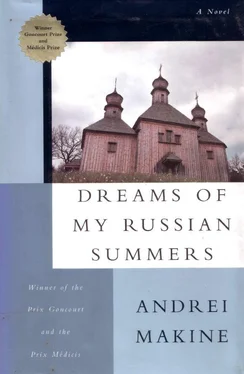Pashka lowered his face and began to extract the fish molded in the clay, poking the embers with a branch. In silence we broke off the crust of baked earth, which came away with the scales, and we ate the tender and burning flesh, sprinkling it with coarse salt.
Nor did we speak as we returned to the city at nightfall. I was still under the spell of the magic that had been wrought, the miracle that had demonstrated to me the overwhelming power of poetry. I sensed that it was not even a question of verbal artifice, nor of a skillful arrangement of words. No! For Hugo's had first been reshaped in Charlotte's retelling long ago and again in the course of my own summary. So, doubly betrayed… And yet the echo of this story, so simple in fact, recounted thousands of kilometers away from the place of its genesis, had succeeded in drawing tears from a young barbarian and driving him naked into the snow. I was secretly proud of having caused a tiny spark to shine from the radiance emitted by Charlotte's native land.
And then, that evening I grasped that it was not anecdotes that I must seek out in my reading. Nor words prettily arranged on a page. It was something much more profound and at the same time much more spontaneous: a deep harmony within the visible world, which, once revealed by the poet, became immortal. Without knowing what name to give it, from now on that is what I pursued from one book to the next. Later I was to learn its name: style. And I could never accept the empty exercises of word jugglers under this name. For in my mind's eye, I would see Pashka's blue legs, thrust into a snowdrift on the banks of the Volga, and the reflections of the flames in his moist eyes… Yes, he was more moved by the fate of the young rebel than by his own narrow escape from drowning an hour before!
Leaving me at a crossroads in the suburb where he lived, Pashka gave me my share of the fish: several long carapaces of clay. Then in a gruff tone, avoiding my eyes, he asked, "And that poem about the men they shot, where's it to be found?"
"I'll bring it to you at school tomorrow. I must have got it copied out at home…"
I said it just like that, finding it hard to contain my joy. It was the happiest day of my youth.
The truth is, Charlotte has nothing more to teach me."
The morning I arrived in Saranza this disconcerting thought crossed my mind. I jumped down from the carriage at the little station. I was the only one getting off there. At the other end of the platform I saw my grandmother. She caught sight of me, gave a slight wave of her hand, and came to meet me. It was at that moment, walking toward her, that I had this insight: she had nothing new to teach me about France; she had told me everything, and thanks to my reading, I had accumulated a knowledge possibly vaster than her own… As I kissed her, I felt ashamed of this thought, which had caught me unawares. I saw in it a kind of involuntary betrayal.
In fact I had for months been experiencing a strange torment: that of having learned too much… I was like a thrifty man who hopes to see his amassed savings quickly bring him a wholly different way of life, open up prodigious new horizons, and change his vision of things – right up to his way of walking, of breathing, of speaking to women. The savings continue to accumulate, but the dramatic change is slow in coming.
So it was with the sum of my French knowledge. Not that I would have wanted to derive any profit from it. The interest that my comrade the dunce showed in my stories amply fulfilled me. I was hoping rather for a mysterious click, like that of the spring in a music box: the grinding sound that announces the start of the minuet to be danced by the little figures on the platform. I longed for this medley of dates, names, events, and characters to recast itself into the stuff of a hitherto unseen life, to crystallize into a fundamentally new world. I wanted the France that was grafted onto my heart, that had been studied, explored, and learned, to turn me into a new being.
But the only change at the start of this summer was the absence of my sister, who had gone to continue her studies in Moscow. I was afraid to admit to myself that her departure might make our evening gatherings on the balcony impossible.
The first evening, as if to confirm my fears, I began to question my grandmother about the France of her youth. She replied willingly, believing my curiosity to be sincere. As she spoke, Charlotte continued to darn the lace collar of a blouse. She handled the needle with that touch of artistic elegance one always sees in a woman who is working and at the same time engaged in conversation with a guest she believes to be interested in what she has to say.
Leaning on the handrail of the little balcony, I listened to her. My routine questions drew forth scenes from the past that I had contemplated hundreds of times in my childhood, familiar images, known characters: the dog barber on the quay by the Seine; the imperial procession passing along the Champs Elysées; la belle Otéro; the president enfolding his mistress in a fatal embrace… I realized at the time that when Charlotte had repeated all these stories to us every summer, she was responding to our desire to hear a favorite tale once more. That was it precisely. They were simply fairy tales that enchanted our childhood and of which, as with all real tales, we never tired.
I was fourteen that summer. I understood only too well that the time for fairy tales would not return. I had learned too much to let myself be intoxicated by their whirling colorful dance. Strangely, instead of rejoicing at this evident sign of my maturity, that evening I felt nostalgic for my former trusting innocence. My new knowledge, contrary to my expectations, seemed to blot out the pictures I had of France. No sooner did I seek to return to the Atlantis of our youth than a learned voice intervened: I saw pages of books, dates in large print. The voice began to comment, to compare, to quote. And I felt myself stricken with a strange blindness…
At one moment our conversation broke off. I had been listening so inattentively that Charlotte's last remark – it must have been a question – escaped me. Confused, I studied her face, which was raised toward me. In my ears I could hear the melody of the sentence she had just uttered. It was her intonation that helped me to reconstruct the sense. Yes, it was that intonation a storyteller adopts in saying, "No, but you must have heard that one before. I'm not going to weary you with all my old tales…," while secretly hoping that his listeners will urge him on, will assure him that they do not know the story or that they have forgotten it… I shook my head slightly, with a doubtful air. "No, no, I don't think so. Are you sure you've told it to me before?"
I saw a smile light up my grandmother's face. She took up the story. This time I listened alertly. And for the umpteenth time before my eyes appeared a narrow street in medieval Paris, one cold autumn night; and on a wall, that grim plaque that had brought together for all time three destinies and three names from days gone by: Louis d'Orléans, Jean sans Peur, and Isabeau de Bavière…
I do not know why I interrupted her at that moment. No doubt I wanted to show off my erudition to her. But chiefly it was a sudden perception that blinded me: an old lady on a balcony, suspended above the endless steppe, repeating once more a story known by heart; she repeats it with the mechanical precision of a gramophone record, faithful to her more-or-less legendary story that tells of a country that only exists in her memory… Our tête-à-tête in the silence of the evening suddenly seemed to me absurd, and Charlotte's voice reminded me of an automaton's. I seized on the name of the character she had just mentioned and started talking. Jean sans Peur and his shameful conspiracies with the English. Paris, where the butchers became "revolutionaries," laid down the law, and massacred the enemies of Burgundy, or those claimed as such. And the mad king. And the gibbets in the squares of Paris. And the wolves roaming in the suburbs of the city devastated by civil war. And the unimaginable betrayal committed by Isabeau de Bavière, who joined forces with Jean sans Peur and denied the Dauphin, claiming that he was not the king's son. Yes, the fair Isabeau of our childhood…
Читать дальше












